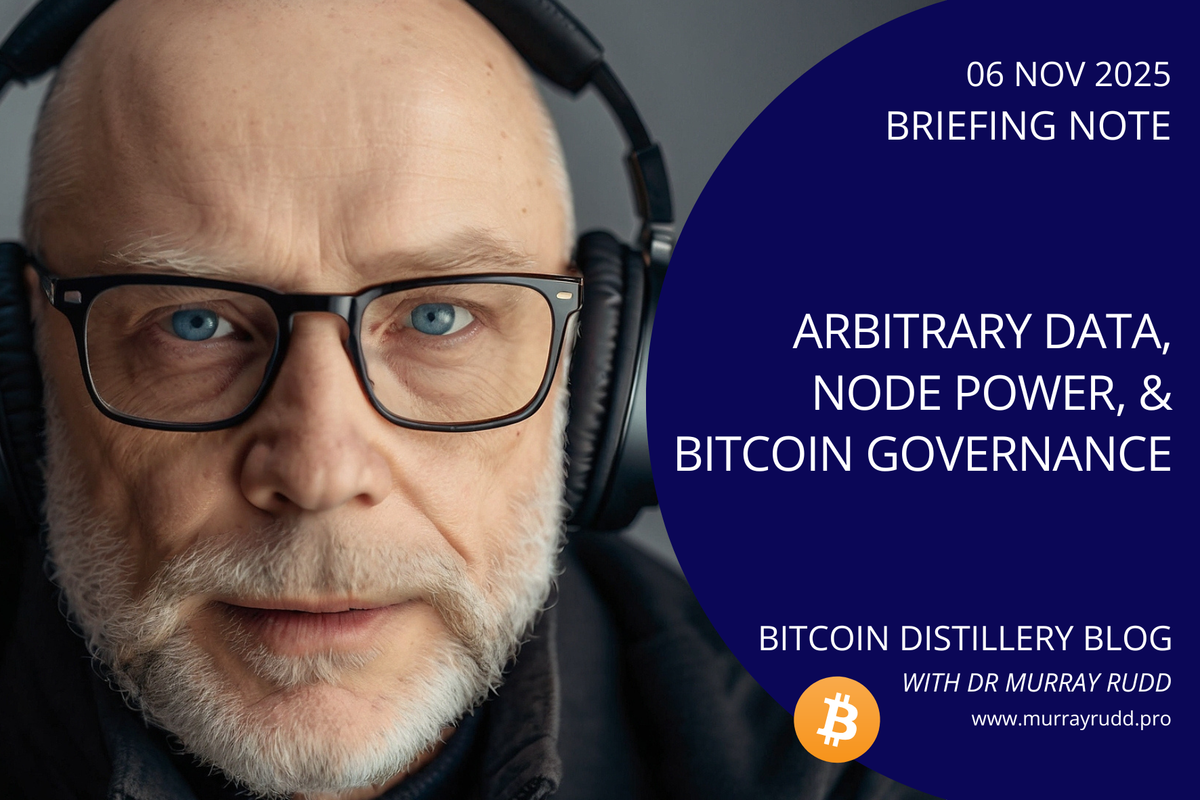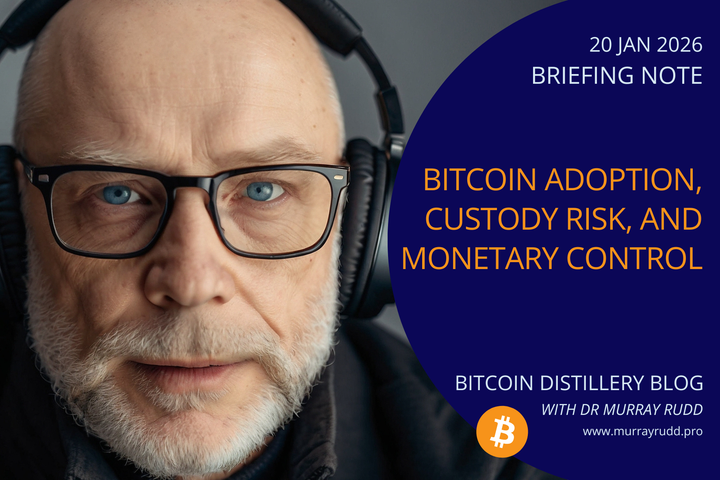Arbitrary Data, Node Power, and Bitcoin Governance
The November 06, 2025 episode of Bitcoin Rails features Matt Hill explaining how relay policy can curb arbitrary data without destabilizing consensus. Exchanges and large businesses - the “economic nodes” - anchor fork outcomes while miners follow the chain with real transaction flow.

Briefing Notes contain: (1) a summary of podcast content; (2) potential information gaps; and (3) some speculative views on wider implications for Bitcoin. Most summaries are for Bitcoin-centered YouTube episodes but I also do some on AI and technological advance that spill over to affect Bitcoin.
Summary
The November 06, 2025 episode of Bitcoin Rails features Matt Hill explaining how relay policy can curb arbitrary data without destabilizing consensus. Hill argues that exchanges and large businesses - the “economic nodes” - anchor fork outcomes while miners follow the chain with real transaction flow. He links rising UTXO pressure to higher hardware baselines and stresses wallet readiness and disciplined communication to reduce fork risk.
Take-Home Messages
- Relay vs. consensus: Use agile relay filters to target arbitrary data while reserving consensus edits for rare, well-coordinated cases.
- Economic gravity: Exchanges and enterprises steer fork outcomes; miners align with the chain carrying real economic activity.
- Hardware baseline: UTXO growth is lifting minimum viable node specs; publish clear guidance to keep participation accessible.
- Wallet readiness: Policy or consensus changes need timely wallet updates and test vectors to protect user workflows.
- Communication discipline: Structured, transparent dialogue lowers escalation risk and reduces the chance of costly chain splits.
Overview
Matt Hill presents “sovereign computing” as a practical response to cloud-era surveillance, censorship, cost, and security risks, positioning always-on personal servers as the natural home for Bitcoin nodes. He stresses that running a node enables direct verification and broadcasting without reliance on third-party backends. This frames the central question of how to address rising arbitrary data on the base layer while preserving monetary utility.
He differentiates relay policy from consensus rules, arguing that filters deployed in implementations like Bitcoin Knots can quickly target known data-embedding vectors. He states that consensus modifications require broad coordination and carry political and operational risk. In his view, filters act as a pressure-release valve that preserves optionality while evidence accumulates.
Hill contends that “economic nodes” dominate fork outcomes because exchanges and large businesses route real economic activity. He notes that exchange control over the BTC ticker shapes public perception during disputes, while miners tend to follow the economically heavier chain to avoid orphaned revenue. He downplays raw node counts relative to transactional gravity from exchanges, payment processors, and enterprise users.
He links 2023–2024 UTXO growth and resource demands to Raspberry Pi failures (sidenote - my Pi-based node was among those) and a migration toward more capable mini-PC hardware and improved sync methods. He argues that viable entry hardware and wallet alignment will determine who participates effectively in relay-policy debates and any potential forks. He warns that poor communication raises the odds of a contentious data-limiting soft fork if stakeholders cannot coordinate.
Stakeholder Perspectives
- Exchanges: Seek clear activation paths and ticker policies to limit market confusion, legal risk, and customer disruption.
- Miners: Prefer predictable fee markets and follow economic flow; wary of direct submission channels that add compliance exposure.
- Wallet Developers: Need stable constraints, test vectors, and timelines to implement changes without breaking user workflows.
- Full-Node Operators: Want filters that curb non-monetary data without degrading payments or forcing expensive hardware churn.
- Merchants and Processors: Require reliable confirmation and mempool visibility so payments are not delayed or dropped by policy churn.
Implications and Future Outlook
If relay filters reliably suppress identified data-embedding vectors, pressure for a data-limiting soft fork will ease and governance can remain incremental. Should filters miss key vectors or induce false positives, stakeholders will weigh activation paths that minimize market disruption and chain-split risk. Exchanges’ ticker decisions and enterprise flows will continue to anchor miner alignment.
Operational baselines will harden as the UTXO set grows, raising the minimum viable specifications for accessible nodes. Clear guidance on pruning, indexing, and hardware will matter for inclusivity and for maintaining diverse political voice in governance. Vendors and maintainers that document viable setups can reduce friction and keep the network broad-based.
Communication practices will determine whether disagreements deescalate into structured problem solving or escalate into coercive tactics. Shared testbeds, transparent relay-policy rationales, and explicit criteria for considering consensus edits can reduce uncertainty. This discipline lowers systemic risk and keeps the focus on monetary utility.
Some Key Information Gaps
- What activation paths for a data-limiting soft fork minimize market disruption and chain-split probability? Policymakers and market operators need predictable procedures that preserve exchange operations and user confidence.
- What signals best predict when perceived economic weight is sufficient to pull miners and exchanges during a fork? Reliable indicators enable earlier stabilization and reduce the duration of contested states.
- When do miner-direct submission channels materially degrade mempool visibility for ordinary nodes? Understanding thresholds protects fee-market integrity and network monitoring.
- What UTXO growth patterns or fee conditions make low-spec hardware non-viable for first-time node operators? Evidence-based baselines help keep participation accessible while maintaining reliability.
- What governance processes ensure protocol work is anchored to explicit user problems rather than engineer curiosity? Aligning development with user needs sustains legitimacy and reduces resistance to necessary changes.
Broader Implications for Bitcoin
Accessibility and the Politics of Nodes
Rising hardware baselines risk concentrating political voice if grassroots node operation becomes costly or fragile. Expect civic groups, vendors, and public institutions to publish audited, reproducible node builds and subsidize entry-level kits to preserve decentralization. These practices extend across jurisdictions and strengthen Bitcoin’s legitimacy as a widely governed monetary network.
Relay Policy as an Innovation Safety Valve
A matured relay-policy pipeline can iteratively test defenses against emerging misuse without locking in brittle consensus changes. Public metrics on false positives and negatives, coupled with scheduled reviews, will calibrate filters and maintain credibility. This approach supports a 3–5-year roadmap where optionality and empirical feedback steer change.
Enterprise Guardrails for Adoption
Institutions will require evidence that protocol governance prioritizes user problems, minimizes coercion, and communicates activation criteria clearly. Documented playbooks, integration timelines, and wallet test suites will de-risk onboarding and widen payment and settlement use. These guardrails apply across sectors and jurisdictions, catalyzing broader adoption while containing operational risk.
Fee Markets and Transparency
If side-channel submissions to miners grow, mempool visibility and price discovery could suffer, affecting users and regulators alike. Transparent norms and miner commitments around submission channels can preserve fee-market integrity while accommodating specialized flows. Similar transparency frameworks will be relevant to other high-throughput or privacy-sensitive ecosystems over the medium term.



Comments ()